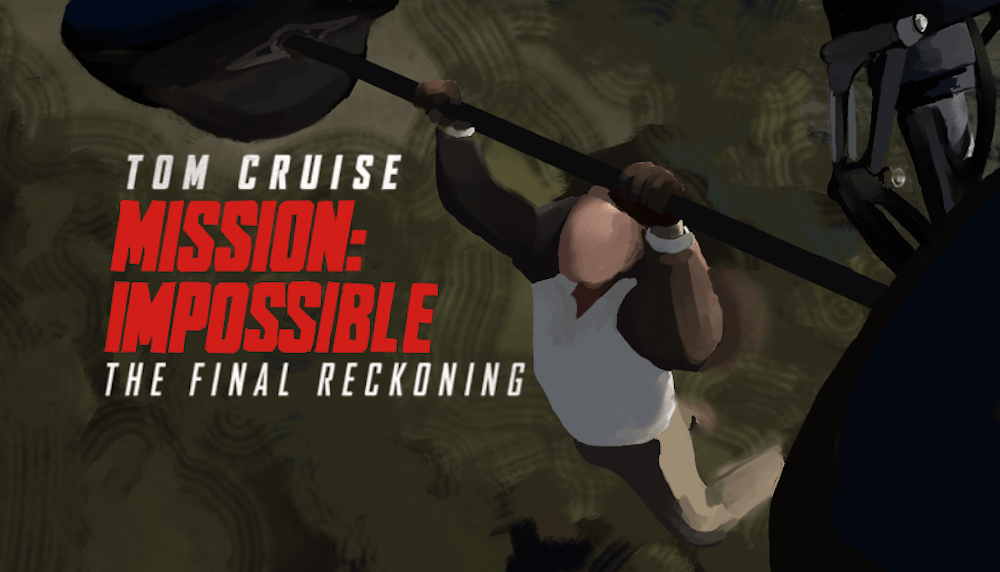Exactly 20 years after the talk show appearance that forever changed his career, Tom Cruise introduced to theaters what may be his final appearance in the iconic “Mission: Impossible” franchise. Directed by Christopher McQuarrie like the three before it, “Mission: Impossible — The Final Reckoning” is equal parts mesmerizing and exhausting, self indulgent and satisfying.
A nearly-three hour reflection on a nearly-30 year tenure as Ethan Hunt, the film tasks Cruise with an impossible mission. He and McQuarrie must pay tribute to 10 delightfully incomprehensible MacGuffins, six brunette love interests with great bone structure and three decades of death-defying stunts –– all while ostensibly upping the ante on every stake at play.
Just like in its seven predecessors, “The Final Reckoning” finds Ethan Hunt once again tasked with a seemingly impossible mission to save the world from looming death and destruction. And just like in its seven predecessors, “The Final Reckoning” is at its best when it leans into its identity as the pinnacle of action filmmaking, an identity which results in some undeniably riveting set pieces.
The problem with the film is that, other than some brief hand-to-hand combat, the first of these set pieces does not appear until almost 70 minutes in. Those 70 minutes are rough. The first hour serves almost entirely as exposition, dedicated to establishing the film’s stakes –– which would be fine, if not for the existence of “Dead Reckoning, Part One,” a full cinematic experience already dedicated to establishing the film’s stakes. As such, this portion cannot help but drag, taking itself far too seriously in a franchise founded on stylish absurdity.
But just as viewers may begin to question if “The Final Reckoning” is another “Mission: Impossible II,” the second hour arrives, bringing with it some breathtaking back-to-back action. In a fantastic sequence set against a blindingly white Arctic landscape, Hunt’s team fights for the coordinates of the Russian submarine introduced in “Dead Reckoning, Part One.”
This sunken ship is revealed to be the home of the latest MacGuffin Ethan must track down. And because nothing comes easy in a “Mission: Impossible” movie, he then goes deep-sea diving in the North Pacific wearing nothing but a pair of boxer briefs as the submarine he is in rolls off the continental shelf. Logistically implausible and physically absurd, sure, but it is “Mission: Impossible” –– physics and logistics do not matter.
It does not matter that the plot is flawed, the dialogue overdramatic, the villain an all-powerful Entity with total nuclear control and no clear weakness other than a 5`7” man with a death wish. The story map is not what viewers come to a “Mission: Impossible” movie to see. They come to see Tom Cruise, time and time again, put his life on the line for cinema.
At the same time, the McQuarrie era of the franchise has brought a new dimension to the character of Ethan Hunt. He may be immortal, but he is not invincible, breaking bones and losing fights and growing increasingly, refreshingly, human. Throughout “The Final Reckoning,” Ethan is limping, battered and bruised –– a far cry from the godlike figure of earlier entries, but a welcome evolution.
And yet it feels like Tom Cruise will continue to hang off planes and jump off buildings until his body can physically no longer do so. His identity, particularly in the wake of that talk show incident, rests almost entirely on his reckless passion in pursuit of total cinema –– which makes it all the more difficult to believe that "The Final Reckoning” could truly be the end of his road with “Mission: Impossible.” The blurring of boundaries between Hunt and Cruise only reinforces the sense that neither can exist without the other, that the actor may never be able to let the character go.
It is not a spoiler to say that Ethan Hunt is still alive at the end of “The Final Reckoning.” But the conclusion of the film also leaves Ethan exactly where he started back in 1996 –– as part of a team. Hayley Atwell, Simon Pegg, Pom Klementieff and Greg Tarzan Davis could very well take up the mantle dropped by Emmanuelle Béart, Kristin Scott Thomas, Ingeborga Dapkūnaité and Emilio Estevez almost three decades ago.
Whether or not Cruise chooses to return as Ethan Hunt, it will not be with his next project, a collaboration with director Alejandro G. Iñárritu characterized as “a wild comedy of catastrophic proportions.” This development is particularly notable given that Cruise has not made an out-and-out comedy since the very early days of his career –– perhaps it signals a return to form for the actor’s actor. Perhaps it will unlock a version of the old Cruise, the Cruise of great choices and greater performances who once bounced from Anderson to Scorsese to Pollack to Spielberg, who could go toe-to-toe with Newman and Hoffman and Nicholson and Hackman.
Only time will tell if he remains capable of drawing in audiences for something other than hanging off planes and jumping off buildings, but for that, Cruise remains in a category of one. “Mission: Impossible” is a franchise about people placing an inordinate amount of responsibility on the shoulders of Tom Cruise. And for all his faults, Cruise remains perhaps the sole movie star dedicated to his craft, and Ethan Hunt remains a defining part of a career that will go down in cinematic history.







